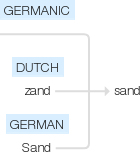Sand
Old English, of Germanic origin; related to Dutch zand and German Sand .
wiktionary
From Middle English sand, from Old English sand, from Proto-Germanic *samdaz (compare West Frisian sân, Dutch zand, German Sand, Danish, Swedish and Norwegian sand), from Proto-Indo-European *sámh₂dʰos (compare Latin sabulum, Ancient Greek ἄμαθος(ámathos)), from *sem-(“to pour”) (compare English dialectal samel(“sand bottom”), Old Irish do·essim(“to pour out”), Latin sentina(“bilge water”), Lithuanian sémti(“to scoop”), Ancient Greek ἀμάω(amáō, “to gather”), ἄμη(ámē, “water bucket”)).
From Middle English sanden, from the noun (see above).
Abbreviation of sand(piper).
etymonline
sand (n.)
Old English sand, from Proto-Germanic *sandam (source also of Old Norse sandr, Old Frisian sond, Middle Dutch sant, Dutch zand, German Sand), from PIE *bhs-amadho- (source also of Greek psammos "sand;" Latin sabulum "coarse sand," source of Italian sabbia, French sable), suffixed form of root *bhes- "to rub."
Historically, the line between sand and gravel cannot be distinctly drawn. Used figuratively in Old English in reference to innumerability and instability. General Germanic, but not attested in Gothic, which used in this sense malma, related to Old High German melm "dust," the first element of the Swedish city name Malmö (the second element meaning "island"), and to Latin molere "to grind." Metaphoric for innumerability since Old English. Sand dollar, type of flat sea-urchin, so called from 1884, so called for its shape (cake-urchin (1853) and sand cake were other names); sand dune attested from 1830.
sand (v.)
late 14c., "to sprinkle with sand," from sand (n.); from 1620s as "to bury or fill in with sand." Meaning "to grind or polish with sand" is from 1858. Related: Sanded; sanding.
